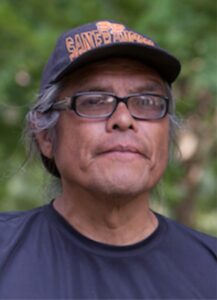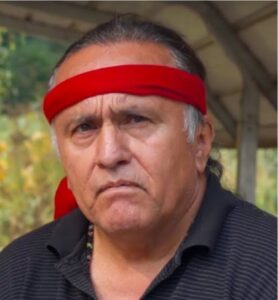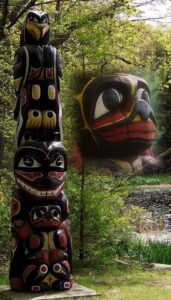
For more information, check into our FAIN section on our website.
Structures of Support and Moral Repair
This group will be working on moving forward a Truth and Reconili-ACTION movement, but it is necessary to put together a presentation that will
- explain the history of Truth and Reconciliation;
- review examples of where Truth and Reconciliation; has taken place and what the results were;
- describe the vision in place for a Truth and Reconcili-ACTION movement for Washington State
The next steps would then to:
- begin encouraging congregations, organizations, allies and partners to officially endorse a Truth and Reconcili-ACTION movement when the Tribes and Nations are ready and
- initiate discussions with State legislators of what would be required to bring forward a legislative initiative or mandate that would create a Commission to conduct the Truth and Reconcili-ACTION process.
Resources on T&R can be found on our FAIN T&R website pages. It is noted that there will be some overlap or intersection with both the other two groups on the Doctrine of Discovery and Rebuild and Maintain the Earth as well as other issues like MMIW, Time Immemorial Curriculum, and more.
Doctrine of Discovery: This group will be working on a plan to
- introduce the Doctrine of Discovery to those who are unfamiliar with it and
- plan a more in-depth study of how the Doctrine of Discovery impacts our First and American Indian Nations in contemporary times.
We will need to develop a separate web section for this group, but in the mean time some resources are:
- The Doctrine of Discovery, Unmasking The Domination Code (film)
- Doctrine of Discovery and Rights of Indigenous Peoples (UUA)
- “Pagans in a Promised Land: Decoding the Doctrine of Christian Discovery” by Steven Newcomb, Fulcrum Publishing, 2008
- redthought.org Expanded and in-depth sessions on the Doctrine of Discovery with JoDe Goudy of Yakima Nation.
Rebuild and Maintain the Beauty of the Earth
This group will be looking to finding ways to address the myriad of environmental issues that intersect with First/American Indian Nations’ concerns. A list of projects will be determined shortly and posted here but the removal of the Snake River dams will be a priority. There will have to be an expansion of our “Challenges to the Salish Sea” web pages to include the Snake River dams and other projects, but in the meant time here are some other resources.
- Nimiipuu Protecting the Environment with Elliott Moffett and Julian Matthews
- Salmon People: A tribe’s decades-long fight to take down the Lower Snake River Dams and restore a way of life. (Seattle Times by Linda Mapes).
- Why restoration of the lower Snake River is necessary to save wild salmon, earthjustice.org
Part II of the Summit . . .
First/American Indian Nations (FAIN) – Friday, December 4, 6:00-9:00 pm PST Workgroup Topics
- Structures of Support and Moral Repair: In this workgroup, we will explore broadly or specifically working towards Truth and Reconciliation, centering spiritual wellness, and collecting stories of harm, resilience, oppression and liberation.
- Doctrine of Discovery: In this workgroup, we will focus on the Doctrine of Christian Discovery, which set the precedent for the legal justification of theft of the lands of Indiginous Tribes and Nations. Workgroup participants will work with stakeholders to help identify the impacts on Indigenous Tribes and Nations, as well as legal processes to overturn related case law.
- Rebuild and Maintain the Beauty of the Earth: In this workgroup, we will explore broadly or specifically working towards preservation of the species and traditional ceremonial subsistence, water protection of the Salish Sea, the Snake River and other watersheds, and work toward consensus by Indiginous stakeholders on adhering to environmental protection laws.
JUUstice Washington continues its efforts to engage UUs and their allies and partners to support Indigenous communities and organizations. Assaults on Indigenous communities have increased and intensified as battles for acknowledgement, recognition and sovereign rights are playing out on the streets, in the legislatures and Congress and in the Courts. Fossil fuel and extraction projects, Murdered and Missing Indigenous Women, Snake River dams, Termination attempts, attacks on ICWA, historical trauma, the COVID-19 fiasco, ongoing threats to the Salish Sea and more, require an expanded and more highly engaged response from us to work together to protect sovereignty, cultural continuity, the rights of nature and to initiate a formal Truth and Reconcil-Action process.
The October 9th panel was a resounding success and our panelists were in outstanding form and many will be rejoining us for the December work strategy session once again. If you missed the October panel and are interested in viewing the recording of it, go to https://juustwa.org/summit2020 and register for Part II. The links will be given to you with your registration confirmation and get you signed up for the 4-6th weekend strategy session.
Part II work groups will be looking to cover a wide range of topics in all their complexities including the Doctrine of Discovery, Truth and Reconciliation, Protect the Salish Sea priorities including the removal of the Snake and Columbia River dams.
In the meantime here is a brief summary of what our panels had to say during the October 9 panel session.
Deborah Parker: Deborah’s presentation spoke to our current situation with the pandemic and its impact on our lives. The isolation that it has created has allowed for reflection on many things that impact our lives: the loss of elders and loved ones; looking at pain, grief and trauma, the uncertain future of our youth and the ongoing struggle to regain what has been lost. It’s also a time to reflect on the importance of balance, teachings and ceremonies, of friendships and partnerships that are needed in healing and creating spiritual wellness.
Jewell James: Jewell’s presentation covered a number of concerns specifically calling out anthropocide: the death of the Earth. He spoke of challenges to the health of the Salish Sea, the Orcas, Salmons and seals; of pollution and toxins. He spoke of dismantling dams, the important role of the salmon in Native life and the intertribal conflicts over what little now remains of the salmon. He spoke of the necessity for all groups, communities and organizations to work together to speak out for the Earth and to help carry the Tribes/Nations voices into places like the legislature and struggling to get . He told stories of slaughter and waste of the salmon and giving permission to the youth to speak out and become involved.
Elliot Moffett: Elliot described Nimiipuu’s resistance to the megaloads, equipment headed to the Canadian tar sands projects and its current involvement in the dismantling of the Snake River Dams for the health of the salmon and to be unity with other Tribes and Nations. He also stressed the necessity of groups and organizations working together to create more protections for Mother Earth, citing how the Nez Perce have passed a resolution granting the Snake River with rights. He spoke of the importance of other species like the gray wolf and grizzly. He also stressed the importance of native food sovereignty.
JoDe Goudy. JoDe stressed the importance of the influence of ceremonies, language and teachings particularly in his own life as a youth. He presented more in-depth information on the impact of the Doctrine of Christian Discovery on Tribal lives, from the past to contemporary times. He spoke about his experience with the Pope and other papal authorities over rescinding the original papal bulls that created the Doctrine of Discovery. He described several Supreme Court decisions that have had a direct impact on what Tribes/Nations can and cannot do by setting and using the Doctrine of Discovery as a legal precedent. He recited the story of Captain Gray’s claiming of lands along the Columbia River and the current efforts to remove Columbia River dams.
Part I Summit – FAIN Panel: October 9, 2020 • 6:30 pm
Elliot Moffett
Son of Walter L. & Bernice Moffett, along with six siblings; grandparents: Sarah & Harry Moffett, Julia & William Allen, Delia & Joseph Williams; graduate of Kamiah High School, Nez Perce Indian Reservation (NPIR); Joel Tum yep tse yo & Meredith Ee tah la, son & daughter of Elliott and Reine; Vonda and Elliott’s son is Von Walter Moffett, Taqasa ‘yo xot ‘ipelikt. Elliot is a member of the Nez Perce and formerly Tribal Executive Committee member/officer. He served as natural resources subcommittee chairman, executive board of directors, chairman Nez Perce Tribe Forest Products Enterprises, inter-Tribal Timber Consortium, and the Columbia River Inter-Tribal Fish Commissioner (CRITFC). Elliott has worked with the Bureau of Indian Affairs serving in federal trust positions as NEPA and an environmental coordinator. His education includes a political science degree from the University of Washington and certification as a federal program technician paralegal from the American Indian Law Center. Currently, Elliott is an employee of the Nez Perce Tribe Gaming Commission appointed as Director and a Board member of Nimiipuu Protecting the Environment.
Jewell Praying Wolf James is enrolled at Lummi and is currently with the Lummi Sovereignty and Treaty Protection Office. He is a lifelong activist in efforts to protect forests, rivers, Salmon habitat and the Salish Sea. Jewell is dedicated to environmental restoration and preservation and works to build bridges of understanding between tribes, between federal and State governments and agencies and between Tribes and the non-Indian communities. He is a master carver with the Lummi House of Tears carvers has carved and gifted several healing Totem Poles including three totem poles to honor the victims of 9/11. Other of his healing Totem Poles reside across the U.S. and Canada as sentinels watching over lands and waters being adversely affected by fossil fuel and resource extractive industries. Currently he is working to secure the return of Sk’aliCh’elh-tenaut (Tokitae) who was forcibly captured 50 years ago from the waters of the Pacfic Northwest and removed to Miami Seaquarim in Florida.
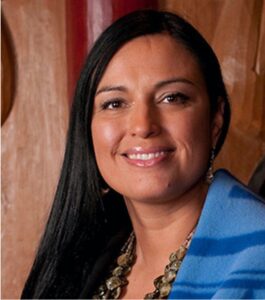 Deborah Parker is a member of the Tulalip Tribes. She served as the director of the residential healing school of the Tsleil-Waututh First Nation. For the Tulalip Tribes she developed the Young Mothers program, a culturally relevant initiative for teen mothers. She also served as the Legislative Policy Analyst in the Office of Governmental Affairs for the Tribes and served as vice-chairwoman of the Tulalip Tribes from 2012 – 2015. Deborah has served on a number of organizations including a trustee board member for the Smithsonian Institution’s National Museum of the American Indian. Among many things, she is currently with the Marysville School District serving as its director of Equity, Diversity, and Indian Education; a board member of the National Indigenous Women’s Resource Center and the senior strategist for Pipestem Law specializing in representing Native American interests.
Deborah Parker is a member of the Tulalip Tribes. She served as the director of the residential healing school of the Tsleil-Waututh First Nation. For the Tulalip Tribes she developed the Young Mothers program, a culturally relevant initiative for teen mothers. She also served as the Legislative Policy Analyst in the Office of Governmental Affairs for the Tribes and served as vice-chairwoman of the Tulalip Tribes from 2012 – 2015. Deborah has served on a number of organizations including a trustee board member for the Smithsonian Institution’s National Museum of the American Indian. Among many things, she is currently with the Marysville School District serving as its director of Equity, Diversity, and Indian Education; a board member of the National Indigenous Women’s Resource Center and the senior strategist for Pipestem Law specializing in representing Native American interests.
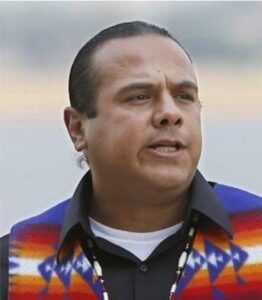 JoDe Goudy is a member of the Confederated Tribes of Yakama Nation. He is the former chairperson of the Yakama Nation Tribal Council and founder of Redthought.org and is currently engaged in addressing the Doctrine of Discovery and other legal doctrines and decisions and their impacts on Indian Country.
JoDe Goudy is a member of the Confederated Tribes of Yakama Nation. He is the former chairperson of the Yakama Nation Tribal Council and founder of Redthought.org and is currently engaged in addressing the Doctrine of Discovery and other legal doctrines and decisions and their impacts on Indian Country.
